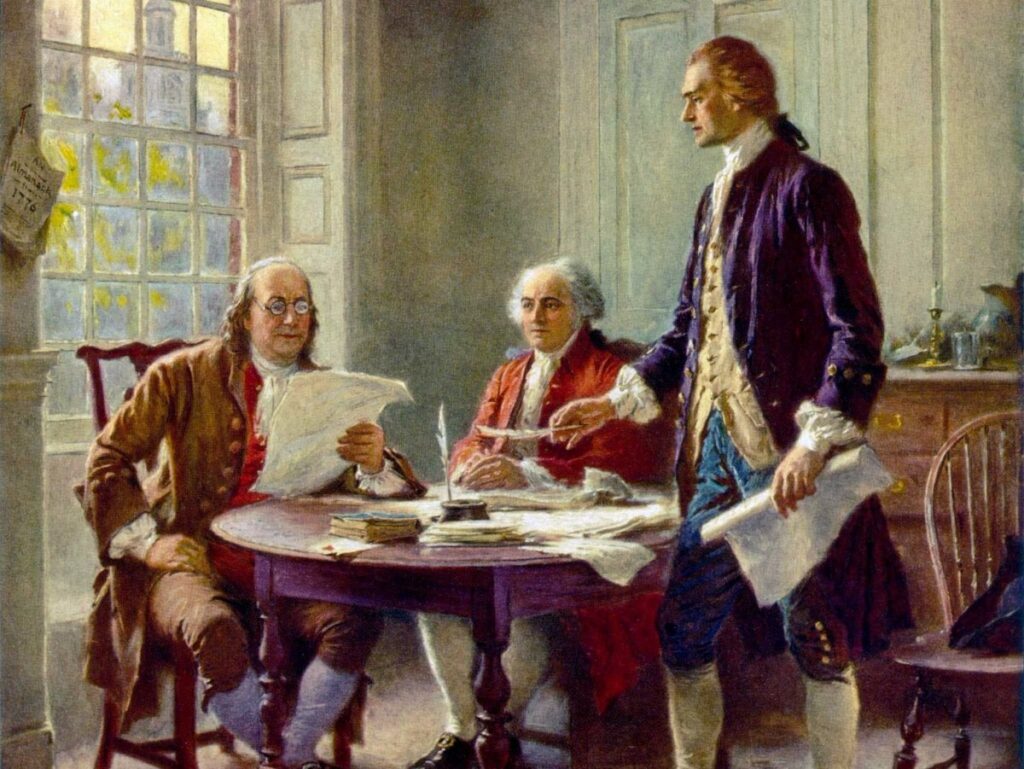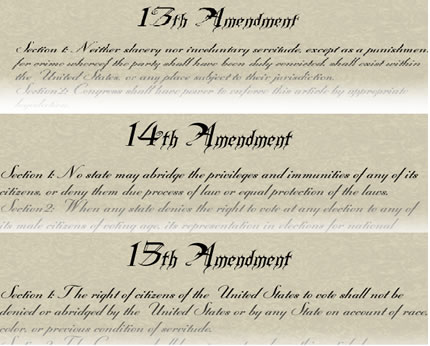
Join the Winchester Republican Town Committee in our most important long-term effort – promoting the principles of individual freedom and mutual respect that unite our Town, our State, and our nation.
American society flows from the United States Constitution (1789) – and its unique protections for individual freedom. We are an Island in the River of History. Winchester Republicans ask all citizens of the Bay State to join us in promoting the American dream of individual freedom.
Island in the River of History
Throughout history, some have seized the force of government to impose their will on others. Their titles have changed, but their purpose – subjugation of the minds and people they rule – has not. Before 1776: warlord, baron, king. After 1776: Committee of Safety, Fuhrer, Duce, Vozhd (Stalin), Supreme Leader (Mao), President for Life.
Alone in history, America is the Island of free minds.

Our Constitutional Place in American Society
- Every American is in public service when she is in productive pursuit of her own happiness. She is of equal importance to any elected or appointed official.
- The countless talents, interests, and efforts of millions of Americans make each of us free to choose how to productively apply our own talent and effort in pursuit of our own happiness.
- Our Constitution rejects the false claim that the achievement of an individual only comes at the expense of others.
- The US Constitution is unique in: (i) restraining government from infringing individual rights; and (ii) protecting the general exercise of these rights with others under the common law.
- The US Constitution established the first moral government in history, placing officials under its restraints.
- Until the Constitution, other governments were above and outside the moral law, free to act in the interest of rulers and favored groups – with force as justification.
- Under our Constitution, government’s primary obligation is to protect the right of every citizen to productively apply his talents, interests, and efforts as his mind sees fit – i.e., to live, freely.
- Our Constitution requires limited government on moral grounds. Throughout history, unlimited government has oppressed the human mind – which, by its nature, yearns to live freely.
- Rigorous evaluation of the ideas, talent, skill, interests, and efforts of an individual on the merits is essential to achievement in a free society. [Examples: education, employment, medicine, science, engineering, sports, the arts.]
- Rigorous self-evaluation of one’s ideas, talent, skill, interests, and efforts is an essential skill in the pursuit of happiness.
- Our Constitution guarantees American citizens the right to sort themselves in the productive pursuit of their own happiness.
- In most matters of opinion and taste, there are multiple views, and no majority view. The view of a plurality – and even a majority – do not provide a moral basis for government to infringe individual rights.
- The smallest minority requiring protection is one – the individual.
- In most matters of ordinary domestic life, there is no “common good” or “public interest” that can be determined by elected or appointed officials, without preferring some individuals or groups over others.

The Property of Our Minds and Our Efforts
- The moral justification for the use of the power of government is protection of individual rights – the greatest of which is the right to own and control the fruits of our own efforts (property).
- The product of each individual’s efforts is her property, whether that property is a salary, a wage, or an idea, or is used for a home, a vehicle, an education, retirement, or a beer.
- No person has the right under our common law to take the property of another without consent.
- Nor does the government have such right under our constitution.
- Individual property does not belong to the community, nor is it subject to claims for the “common good” without consent of the individual.

Copyright 
Patents 
Trademarks
Trickle Down Theory, Rate Cuts for Everyone, The Mobility of Americans in the Economy
- There is no such thing as a “trickle down” theory of economics. “Trickle down” was a political invention of Franklin Roosevelt’s speech writer. The words are nonsense. Profits don’t “trickle down” to employees, who are hired and paid before it is known whether there is a profit.
- Actual experience confirms that there is a point where tax rates are so high that government would collect more tax revenues by lowering those rates. The change in rates produces a change in individual behavior because future prospects of profit are more favorable. Individuals move resources from tax exempt (or deferred) investments in bonds and land to the active economy. Increased economic activity leads to rising incomes, higher tax revenues, and higher tax payments by the wealthy even at the lower tax rate. For Example: 1925 – Coolidge; 1963 – JFK; 1982 – Reagan; 2002 – GWBush.
- In the global economy, high tax rates in the U.S. encourage the wealthy and the entities they control to make long term investments in other, lower tax countries – avoiding (or deferring) tax payments in the United States.[1] This is beyond government’s power to stop – except by lowering tax rates at home.
- Individual Americans have the most upwardly mobile incomes in history. 95% of the individuals in the lowest quintile of income move out of that quintile during their working years. 29% of the bottom quintile rise to the top quintile. Just 1% of the population stay in the bottom quintile, while three-quarters will be in the top quintile between the ages of 25 and 60.
- Individual Americans move in and out of the quintile brackets of individual income over time. More than half of the people in the top one percent of income in 1996 were no longer there in 2005. Most of the people in the top one percent of income each year are there because of one-time income from the sale of a major asset like a home or a business.

Understanding Disparities and Recognizing Discrimination
- The world has never been a level playing field. Skewed distributions of inputs – talent, interest, effort, and integrity – are common among people. Skewed distributions of outcomes are common in nature, in commerce, and among people.
- Outcomes in human endeavors are not equal – or comparable – or random. Morally neutral factors – crop failures, birth order, geography, technology advances, demography and culture – are among many non-human reasons why outcomes are skewed.
- Disparities in outcomes in many endeavors depends on the satisfaction of multiple prerequisites unique to those endeavors. The absence of even one of these prerequisites results in total failure of the endeavor.
- Disparities in outcomes cannot be attributed exclusively to (i) genetics and (ii) arbitrary differences in behavior toward people based on group identities and regardless of their actual qualities as individuals.
- Accurately observed differences among individuals in talent, interest, skill, integrity, and effort, and objective decisions based on those differences is a skill – an achievement – not discrimination. [Ex: teachers, steel workers, nurses, military, NBA]
- Biased misjudgment or antagonism toward individuals or groups, regardless of their actual qualities as individuals, is discrimination – and immoral.
- Under our Constitution, government: (a) has no right to impose such misjudgments upon individuals or groups, and (b) has no right to attempt to produce specific (equal or other) outcomes for individuals or groups – without regard to each individual’s actual talent, interest, effort, and integrity – by oppressing some individuals or groups in favor of others.
The Problem with Socialism is you eventually run out of other people’s money.
Margaret Thatcher – Prime Minister of the United Kingdom
Collectivism is Retrogressive – Its Failures Are Not Those of Our Constitution
- Marx’s idea to substitute different people to seize the force of government to achieve their own outcomes is as old as mankind. Collectivism (Progressivism or Democratic Socialism) is a step backward – not forward. It is retrogression – not progress.
- Collectivism destroys the right of individuals to use their minds to productively pursue their own happiness. It is immoral.
- Collectivism conflicts with basic principles of economics. It can neither anticipate nor allocate the output of free people.
- The failure of collectivist programs to achieve and/or sustain promised results is the failure of collectivism – not the failure of our Constitution, the common law, or the American Rule of Law.
Read More – Bibliography
These materials rely heavily on the works, thoughts, and words of the authors listed in this bibliography.
The United States Constitution, as Amended.
Hayek, F.A., The Road to Serfdom, Edited by Bruce Caldwell, University of Chicago Press, 2007, 1944.
Rand, Ayn, The Virtue of Selfishness, Signet, 1961, 1964.
Rand, Ayn, Capitalism: The Unknown Ideal, Signet, 1946, 1962, 1964, 1966.
Madison, The Federalist Papers, Mentor, 1961.
Miller, J.B. (Ed.), The Second Bill of Rights and The New Federalist Papers, The New Federalism, LLC, 2012.
Sowell, Thomas, “Trickle Down Theory” and “Tax Cuts for the Rich”, Hoover Institution Press, Stanford, University, 2012.
Sowell, Thomas, Basic Economics, Basic Books, 2015.
Sowell,
Thomas, Discrimination and Disparities,
Basic Books, March 2018.
[1] “Unemployed workers cannot nearly so readily relocate to other countries to take the jobs created there by American investments fleeing higher tax rates at home.” Sowell, Thomas, Trickle Down Theory and Tax Cuts for the Rich, Hoover Institution Press, 2012.